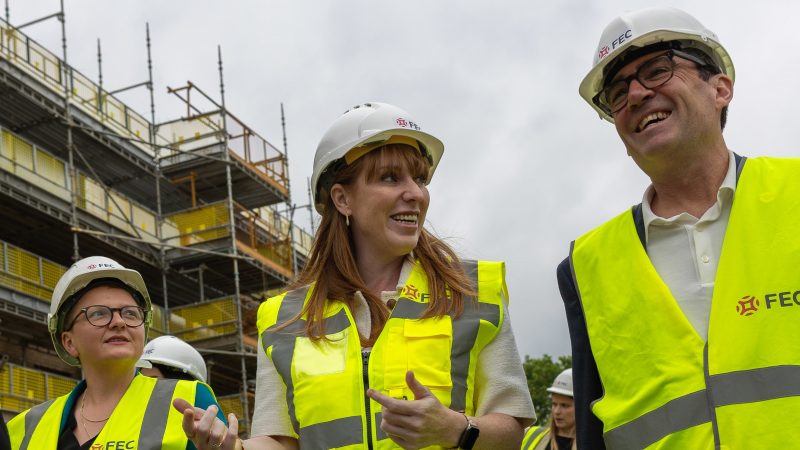
After years of drift and delay, Britain finally has the chance to fix its broken planning system – and Labour should seize it.
Fast-tracking planning reform is not just timely, it’s essential. If we want to grow the economy and meet our net zero goals, we must confront the outdated systems that are holding back vital infrastructure.
The Prime Minister’s team is right to ignore the siren voices of NIMBYism and push for a modernised approach. But real reform won’t come from tweaking rules. It demands a shift in political will, institutional focus, and the culture of delay that has defined the system for decades.
Planning isn’t just a policy issue – it’s a growth strategy.
From clean energy and data centres to housing and rail, too many vital projects are mired in years of delay. The causes are well-known: overlapping jurisdictions, outdated rules, and the political risk of saying “yes.”
Labour’s pledge to fast-track approvals is welcome. But unless we go further, we risk changing speed, not direction.
The upcoming Planning and Infrastructure Bill can and must be a watershed moment. This is Labour’s chance to bring a 20th-century process into the 21st century and unlock clean growth across the UK.
Reform must be centralised and unapologetically pro-build.
My paper, Building the Future of Britain, sets out a bold new model for national-infrastructure planning that cuts the time it takes to obtain consent by 80%, and ensures that projects of national importance receive national consent.
One of the most promising levers is the strengthened use of National Policy Statements (NPS) – not just as high-level strategies, but as active tools for accelerating delivery. Labour should empower NPS to directly authorise projects of national significance.
This could be achieved by tasking the National Infrastructure and Service Transformation Authority (NISTA) with preparing updated, sector-specific NPS documents. These would be subject to parliamentary approval and refreshed annually – setting out a clear, legally robust framework to prioritise major projects and accelerate consent.
This would bring democratic legitimacy to infrastructure prioritisation while moving consent for major projects out of fragmented local processes and into a clear national framework.
This isn’t about bypassing local voices. It’s about engaging affected communities through a structured process that ensures meaningful input, without enabling procedural vetoes. The aim is to replace gridlock with delivery.
The Bill also opens the door to smarter, tech-enabled planning. Labour should go further by digitising environmental assessments, using real-time data and modelling to cut duplication and speed up decisions. Standardised approvals and clearer consultation processes would reduce costs for developers and make public engagement simpler and more effective.
Above all, we need to take on the blockers and rebuild public trust.
Trust isn’t earned by doing nothing. It comes from delivering real benefits – jobs, homes, cleaner air, and cheaper energy. Reform must be accompanied by stronger engagement tools, transparent benefits frameworks, and a clear national story about how planning supports local wellbeing.
Of course, reform won’t be easy. There will be vocal opposition from parts of the commentariat and political class who are comfortable with the status quo, and who mistake delay for democratic rigour. Labour must resist this. If it flinches now, it risks stalling its economic, environmental, and delivery missions before they even begin.
Reform must include stronger community engagement tools, clear benefits frameworks, and a national narrative that links planning decisions to jobs, homes, cleaner air, and cheaper energy. If the public doesn’t see the upside, they’ll block the process, however fast it’s meant to be.
This is not just a procedural challenge. It is a test of seriousness – about growth, about government, and about delivering positive change.
Now is the moment. Labour has the political momentum, the public mandate, and the and the legislative vehicle.
The question is: will they use it to transform how Britain builds?
Subscribe here to our daily newsletter roundup of all things Labour – and follow us on Bluesky, WhatsApp, Threads, X or Facebook.
- SHARE: If you have anything to share that we should be looking into or publishing about this story – or any other topic involving Labour– contact us (strictly anonymously if you wish) at [email protected].
- SUBSCRIBE: Sign up to LabourList’s morning email here for the best briefing on everything Labour, every weekday morning.
- DONATE: If you value our work, please chip in a few pounds a week and become one of our supporters, helping sustain and expand our coverage.
- PARTNER: If you or your organisation might be interested in partnering with us on sponsored events or projects, email [email protected].
- ADVERTISE: If your organisation would like to advertise or run sponsored pieces on LabourList‘s daily newsletter or website, contact our exclusive ad partners Total Politics at [email protected].




More from LabourList
Turning the page? Labour’s recovery in the polls show a path to 2029 victory
Restoration announce recommendations for NEC candidates
‘Factionalism at the top is weakening Labour – and handing a gift to Reform’